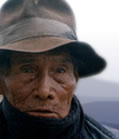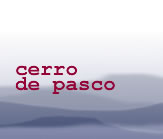THEMES IN THIS
TESTIMONY
Click on arrows
to find more
testimonies
featuring
these themes
|
|
Sex
|
male
|
|
|
Age
|
33
|
|
|
Occupation
|
campesino leader
|
|
|
Location
|
San Francisco de Asis, en Moracocha
|
|
|
Date
|
1995
|
|
summary
Marino speaks as a politician and gives a chronological overview of the actions of the local, regional and governmental organisations in the area. He also describes the long battle for compensation between the communities and the mining companies. The style is rather different to the other interviews – more formal and he never draws on his personal experience. He is supportive of the mayor of Pucará and of efforts towards industrialisation and critical of development policies that encouraged livestock rearing and training instead of processing industries. He criticises several government institutions.
detailed breakdown
|
You will need a password from Panos to view the full
transcript of the interview. To apply for a password, click here.
Once you have a password, click here to go to the beginning
of the transcript. You can also click on any section of the
breakdown of content below and go straight to the
corresponding part of the transcript.
|
| Section 1-2 |
Some history of the area. Talks about the limitations of Agrarian Reform; the campesinos were too poor to invest in the land.
Mentions the communal firm created in Yauli the previous year, which “is not prospering … because of the lack of unification, through lack of awareness, class consciousness, through lack of/the fighting spirit of the campesino classes.” The campesinos are also disillusioned by the disappearance of the banks in which people had savings.
Infrastructure is crucial if they are to industrialise. Despairs that this community has been established so long, but still has nothing. As President of the Special Committee for Potable Water, he secured money for drinking water in the village.
|
| Section 3-5 |
Describes the limited support provided by the district municipality but how the provincial municipality financed electric project. Praises the mayor: “…for me Teodoro Cardenas Casachagua is a divine master with hands of gold.”
Mining companies are closing down, but “we have not benefited from their existence in any way” . In fact, have suffered major environmental damage Negative effects of government rural development policy (through SINAMOS). He criticises the focus on production of primary products, and lack of infrastructure for and promotion of processing industries for leather or wool
Describes the process of the community’s claim against the damage the mines caused to the campesino communities. But “regretfully” his community was not considered in the first resolution
|
| Section 6 |
Now all 16 communities of Yauli have come together formally to demand compensation. Centromin tried to sell off the land which was actually occupied by the campesino people of this community. This forced the comuneros to come together and take a legal stand.
|
| Section 7 |
Stresses the responsibility Centromin should have, as a multi-million dollar operation, to leave small parcels of land to the campesino communities. “Because of a lack of financial technical support, the campesinos have never been able to prosper”.
Highlights the particular problem of inadequate water supply
|
| Section 8 |
As leader of the Agrarian League he knocked on the doors of various mining companies asking for assistance to build a reservoir. “I don’t think professional people are necessarily bad people.” He secured materials, equipment and some funding.
|
|


